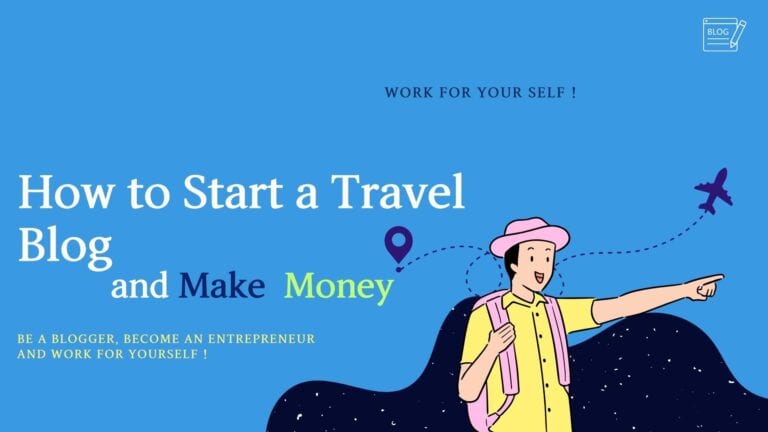Have you ever been wondering “how to start a travel blog”?
Let me ease the nervousness; it’s easier than you think😊. You don’t need much money to get started; you need dedication and interest in travel.
Suppose you love traveling and want to share your experiences with the world. A travel blog can help you!
It helps you show the world your adventures and make some extra money as well.

Table of Contents
ToggleWhat is a Travel Blog?
A travel blog is a website or platform where individuals or travelers share their experiences, advice, and stories about their travels.
Travel blogs often contain personal anecdotes, travel itineraries, recommendations, travel guides, and reviews of accommodations, attractions, restaurants, and more.
They can provide valuable insights, inspiration, and practical information for other travelers planning their trips or looking for ideas and recommendations.
Types of Travel Blogging You Can Start?
You can start different travel blogs depending on your interests and target audience. Here are some ideas:
Budget Travel Blog
Focus on providing travel tips and hacks for people who want to travel on a budget.
Luxury Travel Blog
Share your experiences, recommendations, and tips for traveling in luxury style.
Adventure Travel Blog
Cover niche adventure travel topics such as hiking, mountaineering, surfing, and diving.
Culinary Travel Blog
Highlight the local cuisine of each destination you visit, share recipes, and recommend must-try dishes.
Family Travel Blog
Focus on family-friendly travel destinations, activities, and tips for travel with children.
Solo Travel Blog
Share advice and inspiration for solo travelers, including safety tips, cost-saving ideas, and advice on how to meet other travelers.
Eco-Friendly Travel Blog
Share tips on sustainable travel, eco-friendly destinations, and responsible tourism.
Cultural Travel Blog
Highlight each destination’s history, art, and culture through your travel experiences.
What You Need to Start a Successful Travel Blog?
To start a travel blogging mainly you need the 3 things.
1# Website Name (Domain Name)
One website is mandatory to start your travel blogging journey.
The website name is the same as Domain name.
Choose a Website Name (Domain name) for Your Travel Blog.
I would help you in selecting this.
You can check the availability of your loving website name below.
2# Blogging Platform
As a blogger, we have to manage many things while writing the blogs.
Examples: Content writing, Content publishing, Scheduling, Promotion, etc
Choose the Best Blogging Platform to Manage all.
In a couple of minutes, I will explain this.
3# Hosting
To start a successful travel blog website, this step is critical.
What is hosting?
Keep your website running on someplace (Internet) to be accessible to all.
That place where we keep our website is called Hosting Server.
Choosing the right Web host (Hosting) is very important.
For that, you need some reputed Hosting.
How to Create a Travel Blog Website
In this, You’ll have to buy one Hosting.
Website name (Domain Name) you can get free for one year while buying hosting.
Blogging platform you can use for free.
Now I am going to explain each item in detail.
Step #1 Choose a Website Name to Start Your Travel Blog
You have decided to start a travel blogging.
Great! You are about to take the plunge and start your blogging, vlogging, and photography adventure.
Now as a first step, you have to decide your travel blogging website name.
The website name is also called a Domain name.
A travel blogging website name should be easy for people to find online and remember.
But before all this, you should know what niches are most lucrative in travel blogging, giving you some idea of travel niches.
Some Travel Blogging Niches to Start:
Start a Travel blog for a specific country
Dive deep into the country’s history, culture, attractions, local customs, and travel experiences.
Begin a Fashion Travel blog
Here you can write about fashion of specific destinations, travel outfits, sustainable fashion while traveling, etc
Setup a Sustainable Travel Blog
This niche promotes environmentally friendly practices and focuses on destinations and companies prioritizing sustainability.
Establish a Food and Culinary Travel Blog
This niche explores local cuisine and culinary traditions in different destinations.
Spiritual Place of World
You can share your experiences, insights, and recommendations for spiritual travel destinations.
Start a Wellness and Spa Travel Blog
This niche emphasizes wellness activities like yoga, meditation, massage, and relaxation, often in serene and peaceful destinations.
Establish a Cultural and Heritage Travel Blog
This niche involves exploring different destinations’ history, traditions, and cultural heritage, including visiting historical sites and museums and attending cultural events.
Setup a Wildlife Travel Blog
Wildlife travel is a broad topic, so narrowing your focus to a specific area or type of wildlife is helpful. You could focus on a particular region, such as African safaris or Australian wildlife, or on a specific type of animal, like birdwatching or marine life.
You can also refer to our beginner’s guide for selecting a blog niche.
Now we’ll check that our website name is available or not.
Check Your Domain Name (website name) Availability
Now, pick one name for your website (or Domain).
And check the availability of that name. If available, you can take this; otherwise, choose another name.
Step #2 Choose the Best Blogging Platform
If you want to start a travel-related blog, choosing the best blogging platform can be crucial to your success.
For this, you have to choose the best blogging platform, and WordPress is one of the best blogging platforms in the world.
It has a huge community and tons of free resources that can help you to learn how to blog better. This is precisely what you’ve been looking for if you are a beginner.
Also, you can refer to our guide choose the best blogging platform
If you are looking at how much it costs to start a WordPress blog, go through this.
I recommend the best blogging platform as WordPress (org)
Also, check the difference between WordPress.org and WordPress.com
Step #3 Choose the Best Hosting to Start Your Travel Blog
Hosting is the place where your travel blogging website would be running.
Initially, it is the most important decision you must take.
Depending on your specific needs and budget, several hosting options can work well for a travel blog.
Here are some popular hosting providers known for their reliability and performance.
Bluehost
Bluehost is a widely recommended hosting provider for its ease of use and excellent customer support.
They offer affordable hosting plans with features such as one-click WordPress installation and a free SSL certificate.
Let’s see how to start with Bluehost.
It automatically builds WordPress (the content management system) for your website.
WordPress recommends Bluehost, One of the most reputed and trusted web-hosting service provider among bloggers.
If you are new to this blogging business, starting with Bluehost’s basic plans is better.
Later, you can switch to its higher version.
Steps for Getting Started with Bluehost
Step 1: Select Hosting Plan
Click the below button to select the hosting plan.

Disclosure:
Please note that some links include affiliate links that have no additional cost to you; I’ll earn a little commission, which helps me create quality and well-researched content completely free for my readers. I recommend only those products that I personally feel are helpful for my reader’s blogging journey.
Step 2: Select Bluehost Basic Plan
Bluehost has four plans: Basic, Choice Plus, Online Store, and Pro.
Initially, it would be best if you chose its Basic plan.
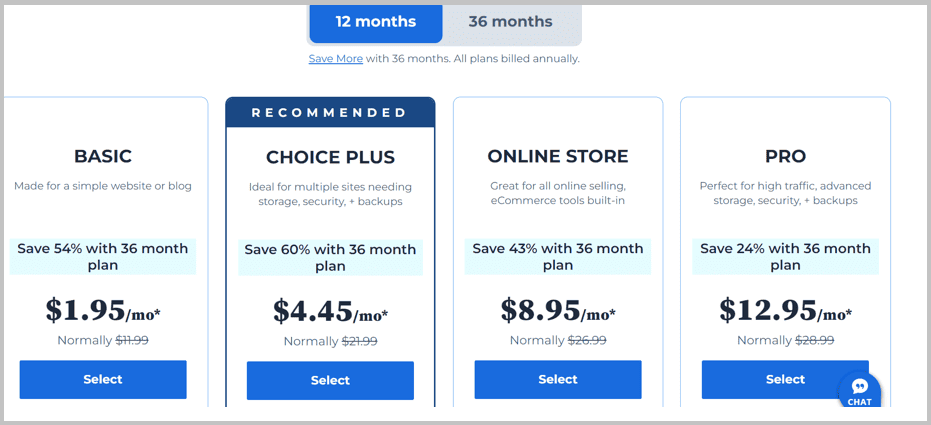
Step 3: Domain Setup page
Next, set up the domain page.
You must give your website a name so that your audience can come and benefit from the information you provide.
The domain name is the address of your website, which readers/audiences search in search engines by typing the URL.
My website address is https://mssaro.com. Here, mssaro is my website’s name; no one could find you without a name.
There are three options, and you can choose any of them.
1. You can create a new domain for free if you haven’t owned one.
2. If you have a domain name on your website, enter the existing domain name
3. You can choose to create your website domain later.
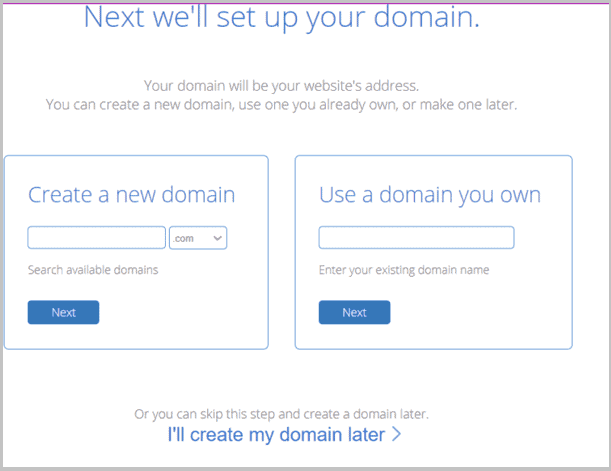
Next, you must create your account by submitting the information below or using your Google account.
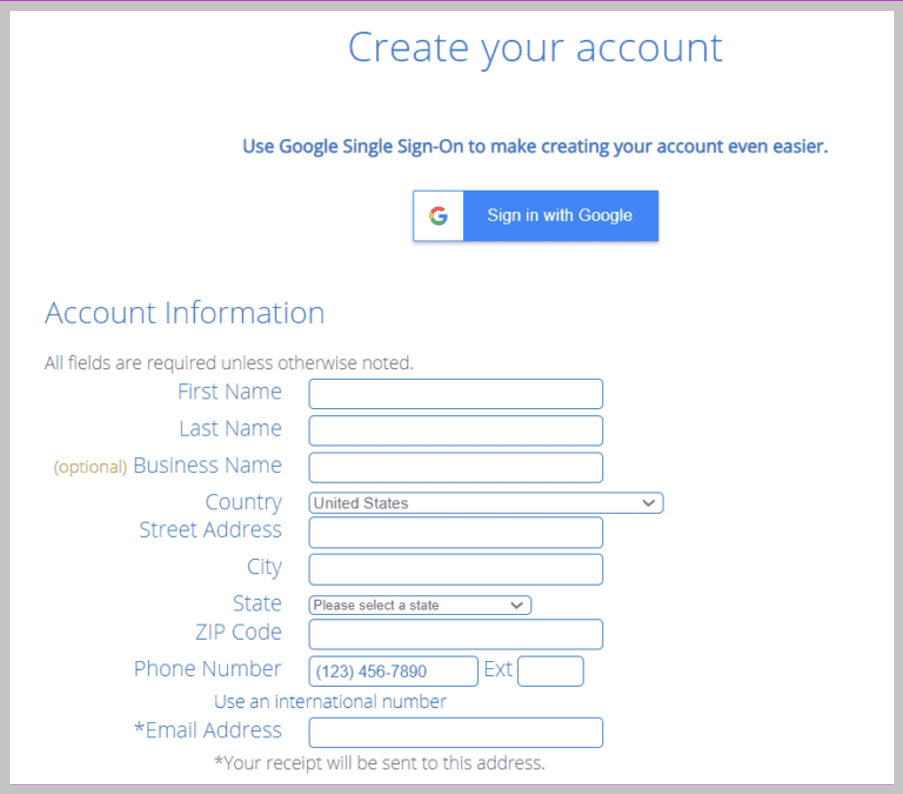
Fill in all the above information. Next, you will see package information.
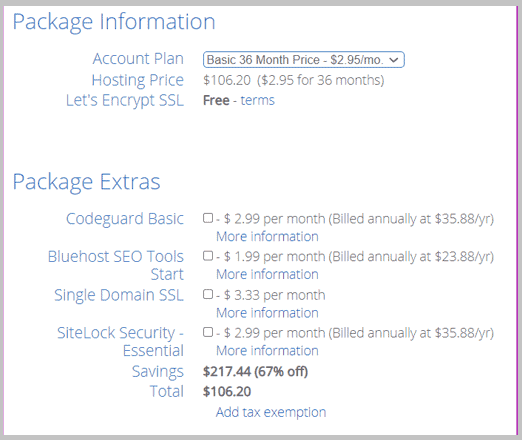
Bluehost provides extra packages you can take or go for later, per your requirements.
It’s better to uncheck all the packages initially and get hands-on blogging, and when you feel you need some extra packages, go for that.
So, be sure to uncheck the package you don’t require initially so your cost of purchasing web hosting will not increase.
Next comes the payment information.
Step 4: Now fill in the Payment information details below.
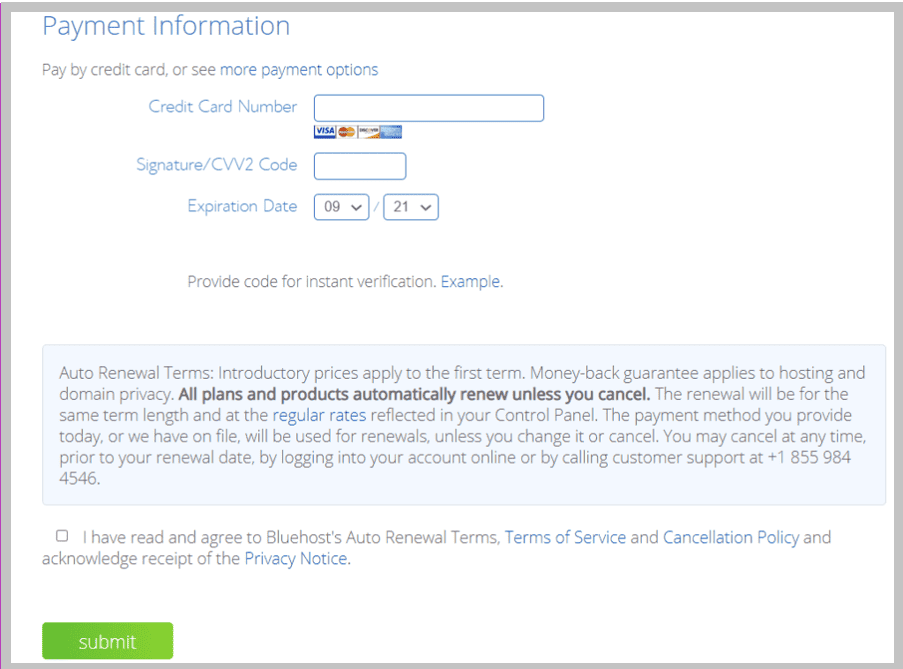
Click on the submit button. You will see your purchase was a success.
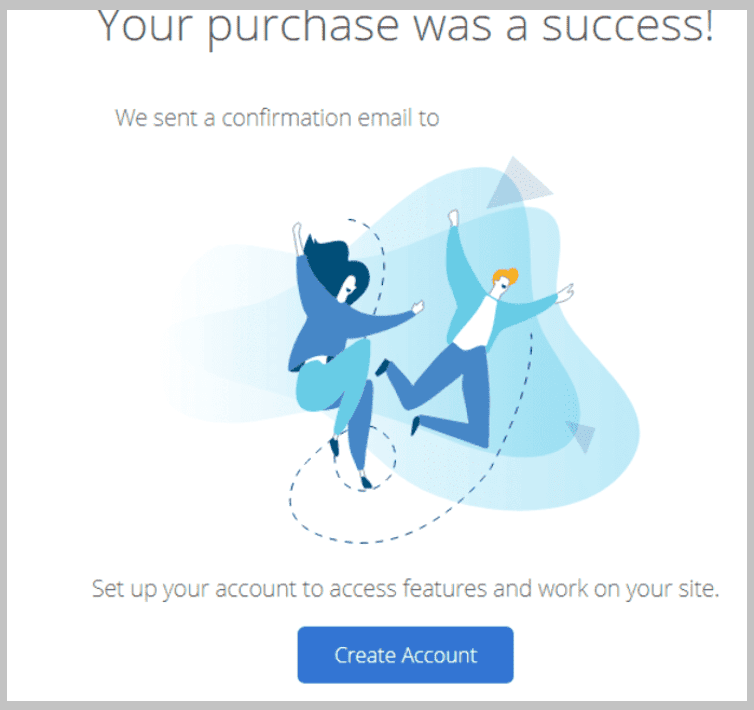
Next, you have to create a password.
Step 5: Create Password
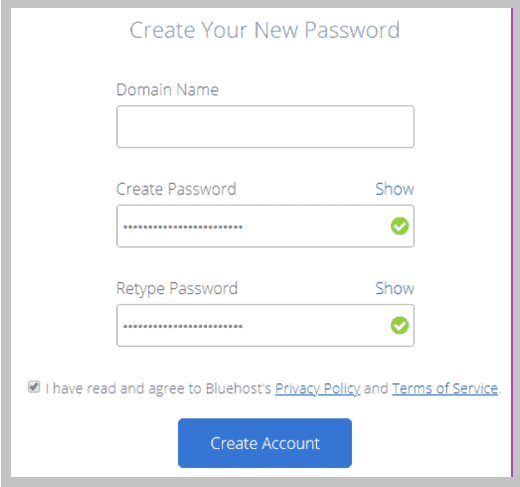
Hurry! You have created your Bluehost dashboard; congratulations.
Let’s log in to your Bluehost with your domain name/ email and password.
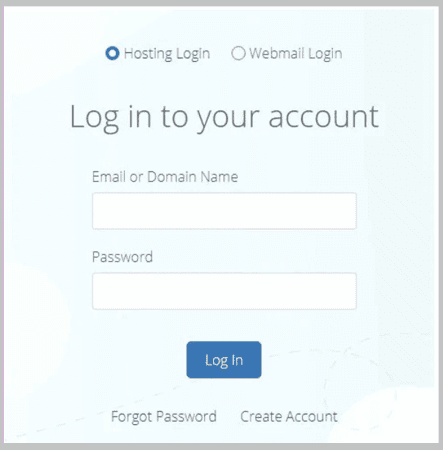
Get Started and Click here to head over to Bluehost.
Step 6: WordPress Installation
Bluehost automatically installs the WordPress when you log in to your Bluehost portal.
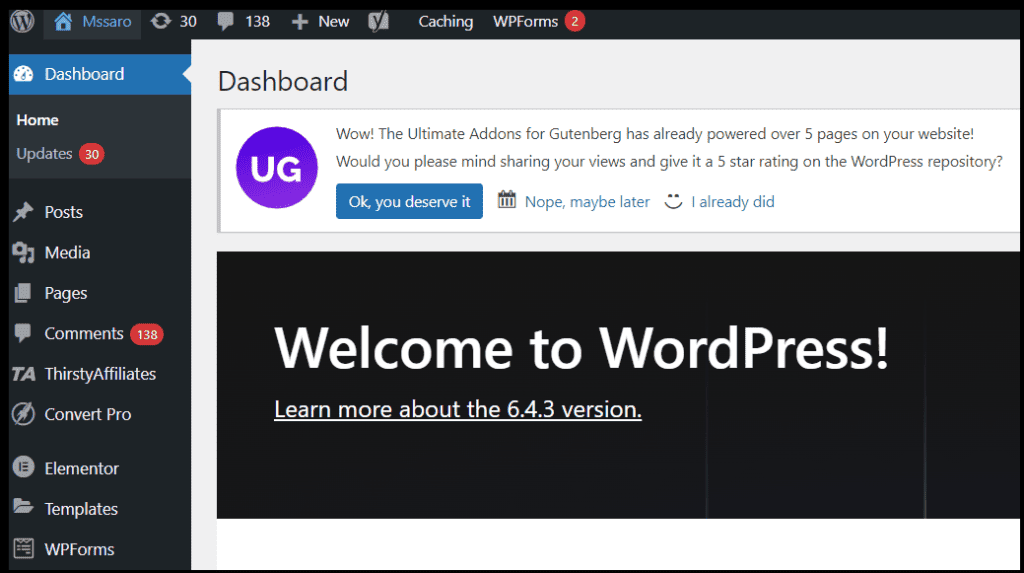
Congratulations! You can see your WordPress dashboard. Isn’t that Great?
You can refer to and compare some other good web hosting service providers.
Some other web hosting service providers are as follows:
SiteGround
SiteGround is another popular hosting provider known for its speed and reliable customer support.
They offer managed WordPress hosting plans tailored for bloggers and provide features like daily backups and free Cloudflare CDN integration.
DreamHost
DreamHost is known for its commitment to security and privacy.
They offer reliable hosting with unlimited bandwidth and storage, one-click WordPress installation, and a 97-day money-back guarantee.
HostGator
HostGator is popular for bloggers due to its affordability and beginner-friendly features.
They offer WordPress hosting plans with unmetered bandwidth and one-click WordPress installation.
When choosing a hosting provider, you must consider your budget, traffic expectations, and technical requirements.
Compare their features, support options, and pricing plans to find the best fit for your travel blog.
Know more about how to choose the right type of web hosting.
Step#4 Design Your Travel Blog Look & Feel (Choose the Theme)
When designing a travel blog, choosing a theme that reflects the adventurous and exploratory nature of traveling is essential.
Points to Consider while Choosing a Professional Theme
When selecting a professional theme, consider the following points:
- Design and Layout: Look for a theme with a clean and modern design. The layout should be user-friendly and responsive, adapting well to different devices and screen sizes.
- Customization Options: Ensure that the theme offers a range of customization options, such as color schemes, fonts, header styles, and page layouts. This will allow you to personalize the theme to match your brand identity.
- Compatibility: Ensure the theme is compatible with the latest version of your content management system (CMS), such as WordPress, Joomla, or Drupal. Check whether the theme is updated regularly to stay compatible with future CMS updates.
- Functionality: Consider the specific features you need for your website, such as e-commerce integration, blog support, portfolio showcase, or event management. Choose a theme that includes these features or is compatible with popular plugins.
- Responsiveness: In today’s mobile-driven world, it is crucial to have a responsive theme that displays well on mobile devices. Ensure that the theme you choose is optimized for mobile responsiveness.
- Page Speed: Page loading time greatly affects user experience. Look for a lightweight theme optimized for speed, as this can improve your website’s performance and SEO ranking.
- Documentation and Support: Check whether the theme includes detailed documentation explaining how to set it up and use its features. Additionally, consider the availability of customer support or forums for assistance if you encounter any issues.
- Reviews and Ratings: Look for reviews and ratings from other users using the theme. This can give you valuable insights into its quality, compatibility, and overall user experience.
- Security: Ensure the theme is developed with security in mind and regularly updated for vulnerabilities. A theme with a security-conscious developer will contribute to the safety and protection of your website.
- Price: Consider your budget when choosing a professional theme, but remember that quality themes often come with a price. Investing in a reputable and well-supported theme can save you time and trouble in the long run.
A few WordPress Themes You Can Use:
Here are a few WordPress blog themes that we recommend:
- Astra: A fast and lightweight theme that offers a variety of customization options.
- Generate Press: A highly flexible and customizable theme built with performance in mind.
- Divi: A popular theme with a powerful visual builder that allows you to create stunning designs.
- OceanWP: A versatile theme packed with features and offers excellent compatibility with popular plugins.
- Neve: It is a lightweight, SEO-friendly theme for bloggers and entrepreneurs.
These are just a few suggestions, as many other great themes are available.
First time when i started , used Astra theme.
Let’s see how to install Astra theme
Go to WordPress Dashboard
Click Appearance –> Themes
Search for your preferred theme, like Astra.

Then click the install and activate button.
Want to know more? Just have a look at the steps for installing a theme blog.
Exploring different themes and choosing the one that best suits your specific needs and preferences is a good idea.
It is better to choose the free theme first of all, and in the future, if you are delighted with that, you can buy it to use a premium feature of that theme.
Step#5 Write Your First Travel Blog Post and Publish
After setting up the WordPress website, it is time to write your first blog.
How to Add Blog Posts in WordPress
To add a blog post in WordPress, follow these steps:
Login to your WordPress admin dashboard.
In the left sidebar, click “Posts” and then choose “Add New Post“.
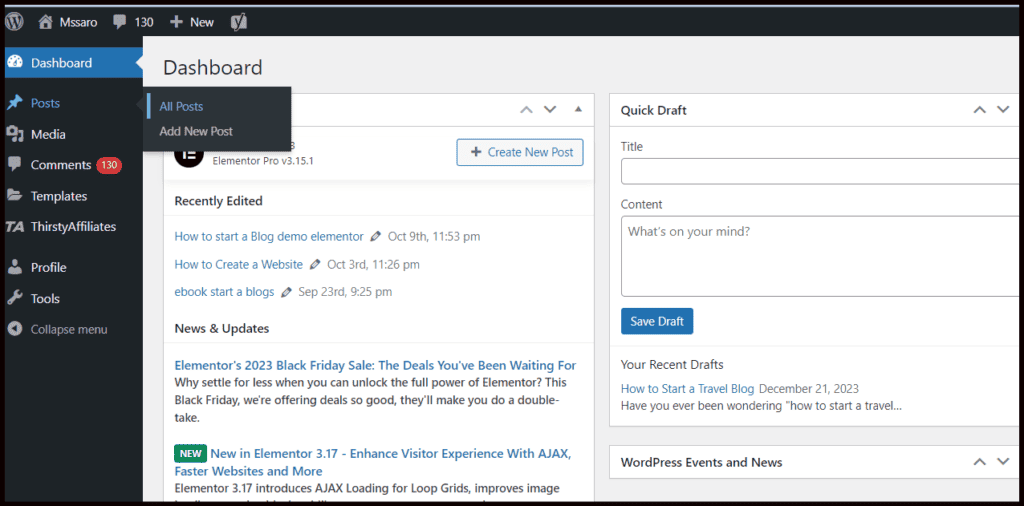
Enter a title for your blog post in the provided field.
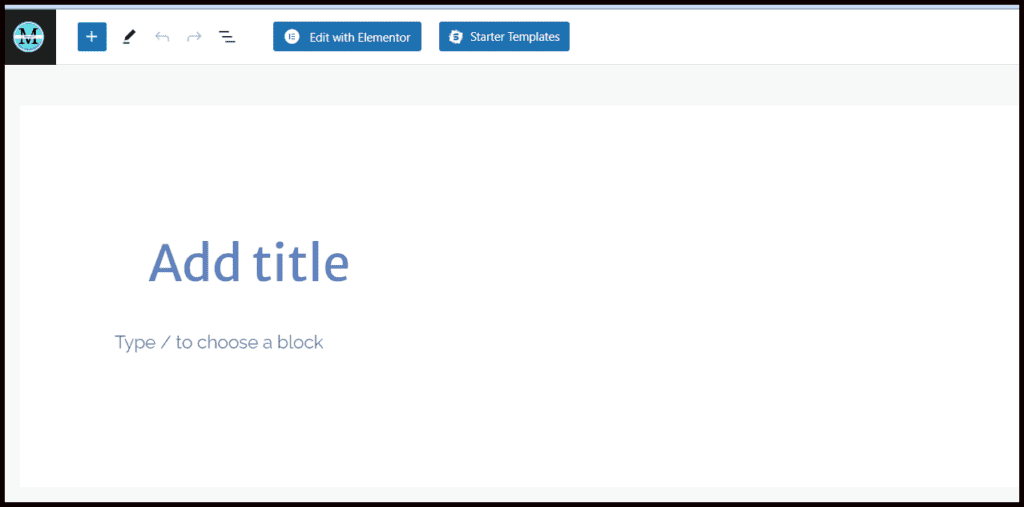
Write your blog post content in the main editor area. The toolbar allows you to format the text, add images, and use various other features.
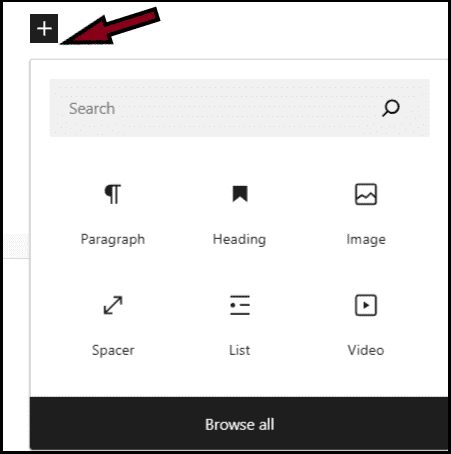
If you want to categorize your blog post, assign it to one or more categories.
You can select a category from the right sidebar under “Categories.”
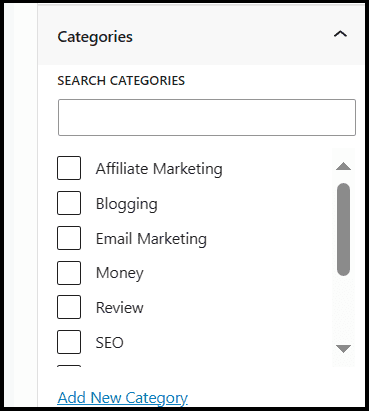
If you want to add tags to your blog post, enter them in the “Tags” box on the right sidebar.
Tags are optional and can help organize and make it easier for readers to find similar content.
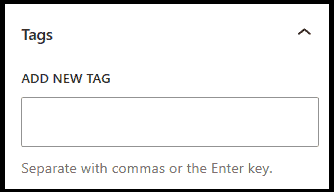
Once you have finished writing your blog post, save it as a draft or publish it immediately; the option is available on the right side.

Before publishing, you may want to review how your blog post will look on the website.
You can do this by clicking the “Preview” button near the “Publish” box.
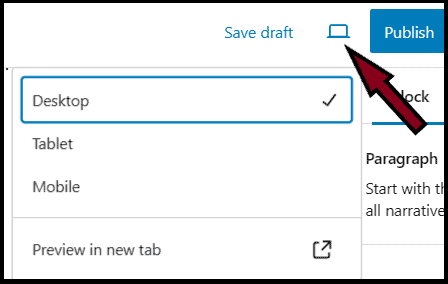
If everything looks good, click the “Publish” button to make your blog post live on your website.
That’s it! You have successfully added a blog post to your WordPress website.
Step#6 How to Promote Your Travel Blog
Create High-Quality Content
Create compelling and engaging content for your travel blog.
Focus on providing helpful information, sharing valuable insights, and adding a personal touch to your writing.
Optimize Your Blog for Search Engines
Implement SEO techniques to ensure your blog ranks higher in search engine results.
This includes using relevant keywords, optimizing meta tags, and improving website loading speed.
Use Social Media Platform
Social media is a powerful tool for promoting your travel blog.
Create accounts on platforms such as Instagram, Facebook, and Twitter, and regularly share content from your blog.
Engage with your followers, collaborate with other influencers, and use hashtags to increase your visibility.
Engage with the Travel Blogging Community
Join online communities and forums where travel bloggers and enthusiasts gather.
Network, share your content, and collaborate with other bloggers, which can help increase your blog’s exposure and engagement.
Use Guest Blogging Opportunities
Write guest posts for other travel blogs or websites in your niche.
This helps showcase your expertise and increases your blog’s visibility to a new audience.
Build an Email List
Create a mailing list and encourage readers to subscribe.
Send out regular newsletters with exclusive content, travel tips, and updates about your blog.
This helps to establish a loyal readership and increase traffic to your blog.
Engage with Your Audience
Respond to your readers’ comments, messages, and emails.
Interact with your audience, ask for feedback, and incorporate their suggestions into your content to build a relationship with them.
Collaborate with Brands and Tourism Boards
Reach out to travel brands, hotels, tourism boards, and other related companies for collaborations.
This could include sponsored posts, press trips, or giveaways, which can help increase your blog’s visibility and credibility.
Attend Travel Conferences & Events
Attend industry events and conferences to network with fellow travel bloggers and influencers.
Participate in panel discussions or presentations. Use these opportunities to share your expertise and connect with potential partners or brands.
Monitor and Analyze Your Blog’s Performance
Use analytics tools to track your blog’s performance and understand the best strategies.
This will help you optimize your efforts and identify opportunities for improvement.
Step#7 How to Monetize Your Travel Blog
To monetize your travel blog, there are several strategies you can implement:
Affiliate Marketing
You can earn money from a travel blog by Joining Affiliate Marketing programs.
You can promote travel-related products or services and earn a commission for each sale or referral made through your affiliate links.
Sponsored Content and Brand Collaborations
As you continue to provide high-quality content and your blog grows, you can collaborate with travel brands and tourism organizations to create sponsored content.
This includes writing sponsored blog posts, social media promotions, or hosting sponsored trips.
Display Advertising
You can display ads on your travel blog that generate revenue through ad impressions or clicks.
For this, you can use Google AdSense, a popular ad network for bloggers. Still, there are also other ad networks and platforms you can explore.
Selling Digital Products
You can sell travel guides, e-book photographs, and online courses related to your topic.
These products can provide an additional stream of income for your blog.
Membership Sites or Subscription Services
If you provide valuable and exclusive content, you can create a subscription-based service where users pay a regular fee to access premium content.
This can include travel resources, insider tips, or personalized travel advice.
Sponsored Social Media Posts
Besides your blog, you can use your social media for sponsored posts and promotions.
This can include sponsored Instagram posts, Instagram stories, or sponsored videos on YouTube.
Essential Things to Do After Launching Your Travel Blog
After launching your travel blog, there are several important things you should do to ensure its success:
Create Valuable Content
Start creating high-quality and engaging content for your blog.
This could include travel guides, destination recommendations, personal travel stories, tips, and advice. Make sure your content is unique and adds value to your readers.
Optimize Your Site
Enhance the user experience and optimize your blog for search engines.
Make sure your website is mobile-friendly and has fast loading times.
Use search engine optimization (SEO) techniques to improve your blog’s visibility in search engine results.
Promote your Blog
Promote your blog and share your content on social media platforms like Instagram, Twitter, Pinterest, and Facebook.
Engage with your audience, join travel blogging communities, and collaborate with other bloggers to increase your exposure.
Create a Mailing List
Offer a newsletter subscription where readers can receive updates and exclusive content from your blog.
Building an email list will allow you to reach your audience directly and promote your blog.
Engage with your Audience
Respond to comments on your blog and social media platforms. Encourage feedback and build relationships with your readers.
Monetize your Blog
Explore ways to monetize your travel blog, such as through affiliate marketing, sponsored posts, advertising, or selling your products.
However, ensure that monetization methods align with your blog’s content and audience.
Track your Analytics
Set up tools like Google Analytics to track your blog’s performance.
Monitor your website traffic, user engagement, and referral sources.
This data will provide insights into what works well and help you make informed decisions about your blog’s growth and strategy.
Network and Collaborate
Attend travel industry events, connect with other bloggers, and collaborate on projects or guest posting.
Building relationships within the travel blogging community can open opportunities for exposure, partnerships, and shared resources.
Continuously Improve and Learn
Stay updated with the latest trends in travel blogging, learn new skills, and adapt your strategies accordingly.
To grow your expertise, attend webinars, read books, take online courses, and stay connected with the travel blogging community.
Stay Consistent
Consistently publish new content on your blog and engage with your audience.
The more active and dedicated you are, the more your blog will likely grow and develop a loyal readership.
Top Travel Blogs to Follow
Migrationology
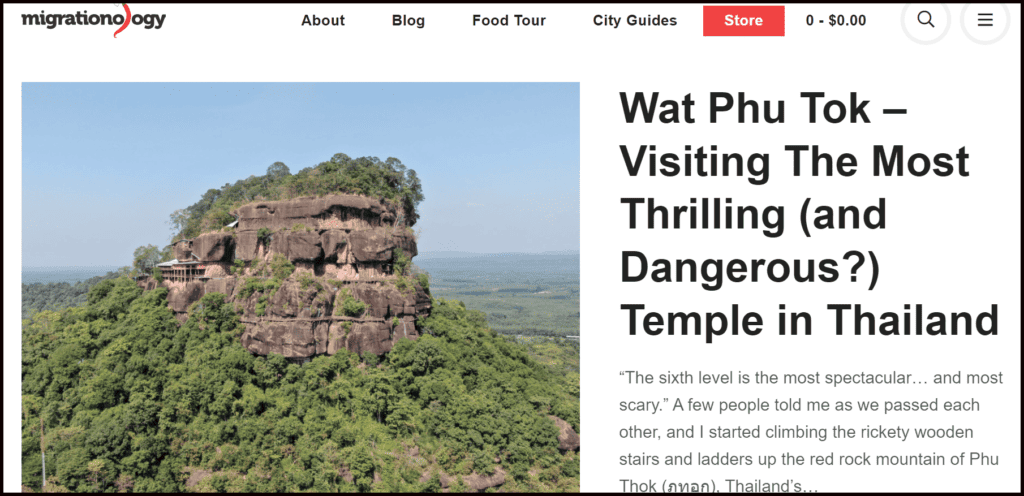
It’s a website run by Mark Wiens. Mark Wiens is a famous travel blogger, video creator, and food lover.
Run a YouTube channel, ‘Mark Wiens.
Nomadic Matt
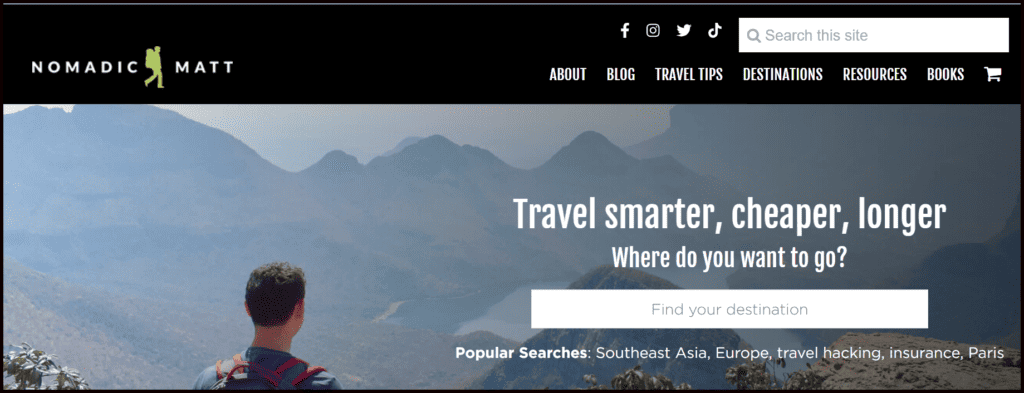
It’s a website that helps you to plan a trip. Matt Kepnes runs this website.
He is an acclaimed blogger who has received many awards.
Why Should You Start a Travel Blog?

There are several reasons why you should consider starting a travel blog:
- Documenting your experiences: A travel blog allows you to share your adventures and memories with others. It becomes a personal journal of your travels, allowing you to reflect and relive those experiences.
- Sharing knowledge and inspiration: By blogging about your travels, you can provide valuable information and tips to fellow travelers. You can inspire others to explore new destinations, try new things, and make the most of their trips.
- Building a community: Blogging creates a platform for you to connect with like-minded travelers from around the world. It allows you to engage with your readers, answer their questions, and even meet up with them during your travels.
- Creativity and self-expression: A travel blog allows you to showcase your creativity through writing, photography, and even video content. You can develop your unique writing style and share your perspective on destinations and travel experiences.
- Networking and collaboration: Running a travel blog can open doors to collaboration opportunities with brands, tourism boards, and fellow bloggers. These collaborations can provide unique experiences, sponsorships, and potential income streams.
- Developing new skills: Blogging requires various skills, such as writing, photography, social media management, and website design. Starting a travel blog can be an excellent way to develop and enhance these skills, which can be valuable in many areas of life.
Common Mistakes While Starting a Travel Blog
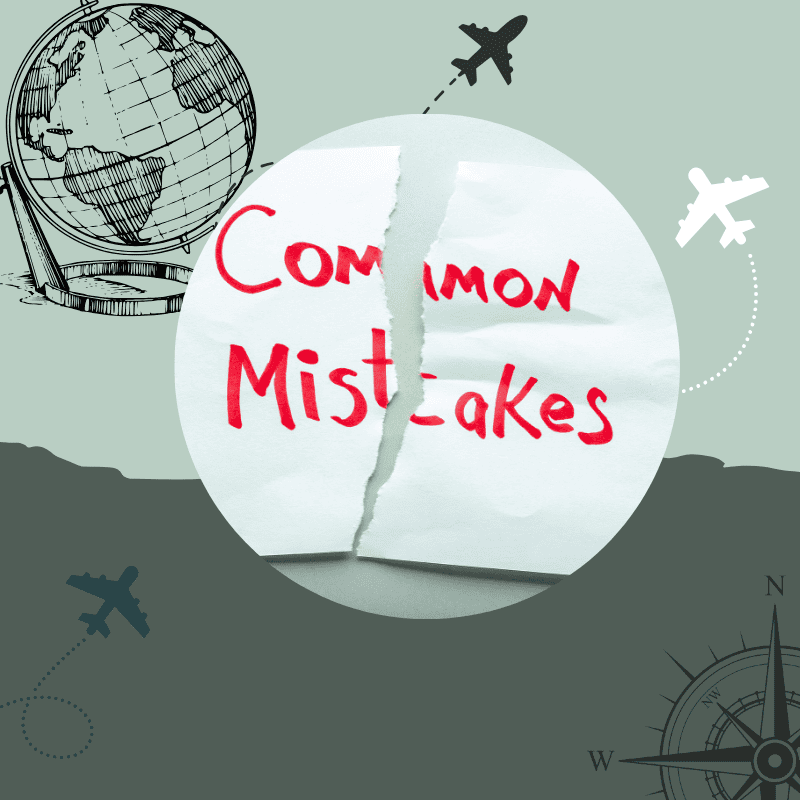
Some common mistakes people make when starting a travel blog are:
- Not defining the blog’s purpose or target audience
- Choosing a generic or hard-to-spell blog name
- Failing to create a consistent and recognizable brand
- Focusing too much on monetization from the start
- Not investing enough time and effort into creating quality content
- Neglecting search engine optimization (SEO) and social media promotion
- Ignoring reader engagement and feedback
- Not having a clear and easy-to-navigate website design
- Choosing low-quality or irrelevant images to accompany blog posts
- Not being transparent or authentic in their storytelling.
It’s essential to avoid these mistakes and take the time to plan your travel blog carefully.
Remember to prioritize quality content to create a successful travel blog.
Last but not Least
Start a travel blog if you’re passionate about traveling.
Not only will it be fun, but it might lead to other work opportunities in travel.
Place yourself in your audience’s shoes when writing.
Decide what they want to read and write it to them.
The more relevant information you can provide, the better your chance of gaining a new audience.
Make sure you pick a topic that interests people (travel) and something you are passionate about.
This will make it easier for you to write about it and create a blog with enough traffic or readers to sustain itself.
What Next to Read (Essential Setting)
After starting your dream blogging business, you must set up some essential settings. This will ensure that your business grows and is noticed.
Let’s see the essential things that must be done after starting a travel blog.
1. Install WordPress essential free or budgeted Plugins like Yoast Seo, ShortPixel, Akismet, and Easy Table of Contents.
2. Submit your website XML sitemap to search engines like Google and Bing.
3. Submit XML Sitemap file to Google Search Console.
4. For on-page SEO, install free Yoast SEO.
5. Integrate free Google Analytics with your travel blog.
Be sure and confident to start a blogging business; it’s a new beginning. So, don’t be confused about whether to start a blog. It’s not a costly affair.
Final Take Away
1. Always share your content on social media platforms like Facebook, Twitter, Pinterest, Instagram, and Quora to get noticed by like-minded people who want to learn about traveling or start a travel blog like you.
2. Make YouTube videos so that your video reaches more and more audiences.
3. Consistency is vital when growing a loyal readership, so post regularly.
Decide on a content schedule that works for you and your lifestyle, and stick to it. Whether you post daily or weekly, ensure your readers know what to expect from your blog and when.
4. Always engaging with your readers and building a community of readers and followers is essential to the success of any blog.
Respond to comments and messages, ask for feedback, and encourage readers to share their travel experiences and tips.
5. Starting a travel blog is just the beginning. To stay relevant and grow your readership, you should always be open to learning and improving.
Attend blogging conferences, read industry blogs and eBooks, and connect with other travel bloggers to learn new tips and tricks.
Starting a travel blog is an exciting endeavor that allows you to share your adventures and insights with like-minded individuals.
By keeping these essential points in mind – defining your purpose, creating compelling content, engaging with your audience, and leveraging social media – you’ll be well on your way to building a successful travel blog.
Happy travels and happy blogging!
Keep Smiling and Start Sharing!!
Frequently Asked Questions (FAQ) on How to Start a Travel Blog
Answer: When choosing a name for your travel blog, make it catchy, easy to remember, and related to your niche.
Answer: Having basic technical skills like setting up a website and understanding how to use blogging platforms will be helpful. However, many user-friendly platforms and hosting providers make it easy to start a blog without technical knowledge.
Answer: Popular blogging platforms for travel blogs include WordPress, Blogger, and Squarespace. WordPress is the best option for blogging.
Answer: To have complete control over your blog, it is recommended that you purchase a domain name (e.g., https://yourblogname.com) and choose a reliable hosting provider. This will help establish your brand and allow you to monetize your blog more effectively.
Answer: Identifying your target audience and focusing on a specific niche can help you stand out in travel blogging. Consider your expertise, experiences, and passions to determine the niche that suits you best—adventure, budget, or luxury travel.
Answer: Your content should be engaging, informative, and valuable to your readers. You can write travel guides, share personal travel stories, provide tips and advice, create destination-specific content, and share travel itineraries.
Answer: Use social media platforms like Instagram, Facebook, and Pinterest to create a presence and share your content. Engage with and collaborate with other travel bloggers, optimize your blog for search engines, and consider guest posting on other popular travel websites.
Answer: You can monetize your travel blog through various methods, such as display advertising, sponsored content, affiliate marketing, and selling products or services. However, building a successful blog that generates income requires time and dedication.

